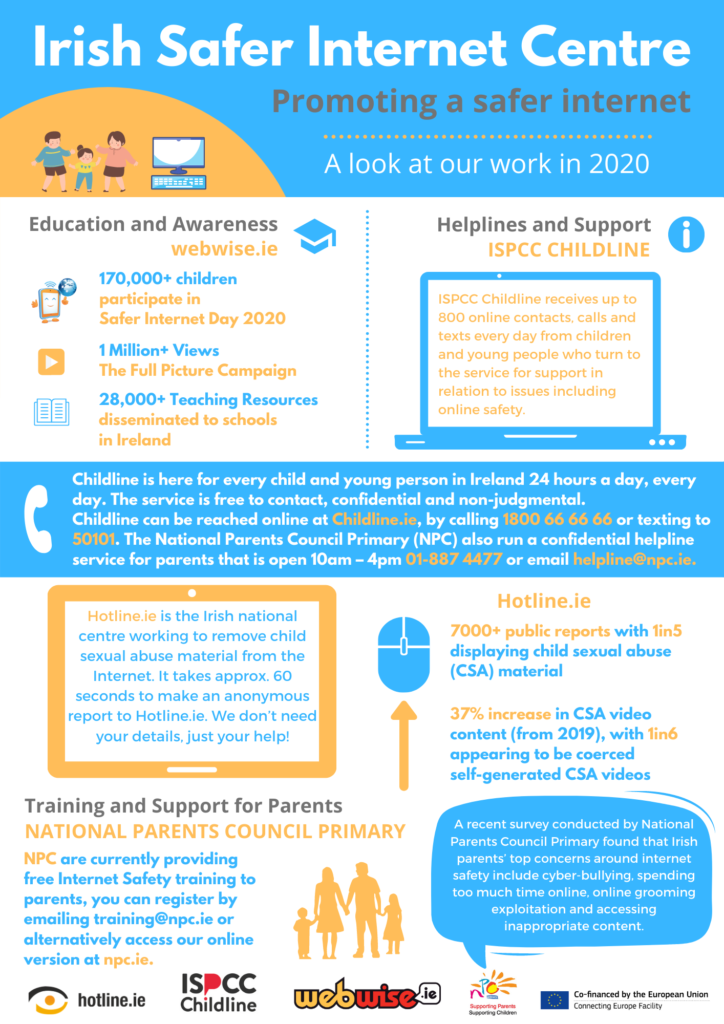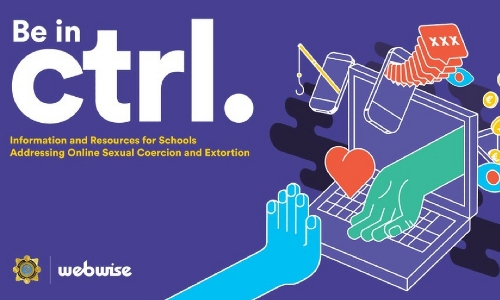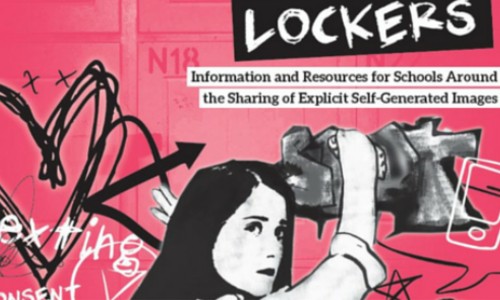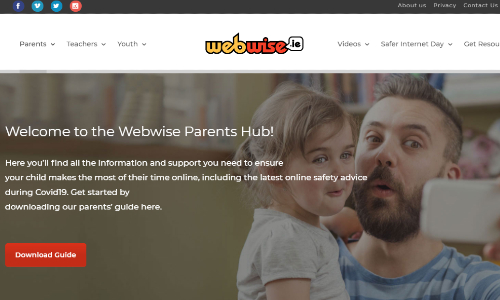European Day of the Protection of Children Against Sexual Exploitation and Sexual Abuse

Webwise, ISPCC Childline, Hotline.ie and National Parents Council (NPC) Primary have partnered under the umbrella of the Irish Safer Internet Centre to provide a range of complementary online safety services and have been working relentlessly towards a shared mission of making the internet a safer and more inclusive environment for children and young people. The member organisations have created an infographic looking back at the work of the Irish Safer Internet Centre in 2020 to date, which can be accessed here: https://bit.ly/3lEEYpr.
On the European Day for the Protection of Children Against Sexual Exploitation and Sexual Abuse, which takes place today (18 November), the Irish Safer Internet Centre is highlighting support services available to parents, carers, children and young people.
This year the Council of Europe’s theme for the day is ‘preventing risky behaviour by children: self-generated sexual images and/or videos’. Children are increasingly using internet and technology to explore and express their sexuality and must be supported in recognising the potential risks involved in this activity. This can include being tricked or coerced into generating images and the onwards non-consensual sharing of such imagery.
In Ireland, the sexual abuse, sexual coercion and sexual exploitation of children are offences under the Child Trafficking and Pornography Act, 1998 as amended by the Criminal Law (Sexual Offences) Act, 2017. The Safer Internet Centre partner organisations are advising parents and carers that, should their child or young person be a victim of such a crime, they are not powerless – support is available.
All parents and carers can help to play a role by keeping lines of communication open with children and young people and highlighting the importance of not sharing further content, not paying money, keeping evidence and reporting the offence to An Garda Síochána.
The Safer Internet Centre partner organisations are of the view that through shared responsibility, knowledge, collaboration, advocacy and a culture of reporting concerns, the whole of society can contribute towards mitigating online risks and building a safer and more positive digital world to safeguard the most vulnerable in society, as they deserve nothing less.
The Irish Safer Internet partner Hotline.ie is a not-for-profit that works in partnership with tech industry, law enforcement, government and a global network of 46 other hotlines to remove images and videos of child sexual abuse (CSA) irrespective of where in the world they may be hosted. In the first nine months of 2020 Hotline.ie has noted a 37 per cent increase in CSA video content (from 2019), with one in six appearing to be coerced self-generated CSA videos. In these cases children may have been groomed, tricked or extorted into producing and sharing a sexual image or video of themselves by online predators. The sexual coercion and extortion of children is generally driven by two main interests: (1) financial or (2) sexual – the latter is when perpetrators are seeking to obtain further sexual content or even initiate an encounter.
A recent survey conducted by Irish Safer Internet Centre partner the National Parents’ Council (NPC) Primary found that Irish parents’ top concerns in relation to internet safety included cyber-bullying, spending too much time online, online grooming, exploitation and accessing inappropriate content.
The NPC Primary supports and empowers parents to become effective partners’ in their children’s education. It operates a helpline for parents, carers and other adults with concerns about children’s use of the internet and is currently providing free internet safety training. To find out more about NPC Primary internet safety training, or to register to take part, email training@npc.ie or see https://www.npc.ie/online-training/internet-safety/story_html5.html. The NPC’s confidential helpline service for parents is available 10am – 4pm by contacting 01 887 4477 or emailing to helpline@npc.ie
Webwise, the Irish internet safety awareness centre and part of the Professional Development Service for Teachers, promotes safer and better internet use among young people by developing and disseminating education resources that help teachers integrate internet safety into teaching and learning in their schools. It also provides training to teachers and second-level students, as well as advice and support for parents. In 2020, Webwise disseminated over 28,000 education resources to schools across Ireland – while over 170,000 students across the country took part in Safer Internet Day. Schools wishing to address the topic of online sexual coercion and extortion can use the free ‘Be in Ctrl’ teaching resource.
ISPCC Childline provides free live online chat, phone and text services to children and young people. The listening services receive approximately 800 contacts from children and young people every day in relation to many issues, including online safety. Childline believes, supports and empowers children and young people who make contact and works to strengthen their resilience to help them cope with any challenges they face. Childline.ie also provides support and information to children and young people on a range of topics they may encounter in life, including online safety issues and more.
For more information about the Irish Safer Internet Centre, see https://www.betterinternetforkids.eu/sic/ireland.

Free Webwise educational resources
Be in Ctrl
Be in Ctrl is a Junior Cycle SPHE educational resource addressing the issue of Online Sexual Coercion and Extortion. The resource includes information for school leaders, three lesson plans and is supported by the Garda Schools Programme.
The Be in Ctrl resource aims to help students in post-primary schools understand that online sexual coercion and extortion of children is a crime, to raise awareness of safe online communication and promote helpseeking and reporting incidents.
The resource can be accessed for free here: https://www.webwise.ie/beinctrl/

Lockers
Lockers is an SPHE resource developed to engage 2nd and 3rd year students on the topic of non-consensual image sharing. The resource includes two short high-quality animations, and six lessons which explore topics such as “The law on sharing intimate content”; “When online sharing goes wrong”; “Victim Blaming”; “Peer Pressure and Non-Consensual Sharing”; “The Influence of Media and Gender Stereotypes”; and “Getting Help”.
The Lockers resource also contains advice for school leaders about how to deal effectively with incidents involving the sharing of explicit images in their school.
The resource can be accessed here: https://www.webwise.ie/lockers/

Be in Ctrl Campaign
The #BeInCtrl campaign raises awareness of the issue of online sexual coercion and extortion, and highlights to young people that this behaviour is a crime.
The campaign features a short film depicting the stories of two teenagers subjected to online sexual coercion and extortion, and the serious consequences that can occur when you do not know for certain who you are talking to and are sharing personal information with online. The campaign promotes appropriate online behaviour, how to protect yourself, and where to find help and support.
The short film compliments the Be in Ctrl teaching resource, and we recommend that teachers use the video as a way of introducing the topic of online sexual coercion and extortion ahead of teaching the Be in Ctrl lessons.
The film can be viewed online here: www.webwise.ie/beinctrl/
Support and Advice for Parents
The Webwise Parents Hub provides advice and support for parents on image-sharing and how to deal with the situation if something goes wrong online for their child. This is done through providing advice videos from experts in the areas of parenting, education and technology, Talking Points to encourage open and honest conversations with their child, as well as free internet safety booklets and resources.
Visit www.webwise.ie/parents for expert, advice, support and resources.






